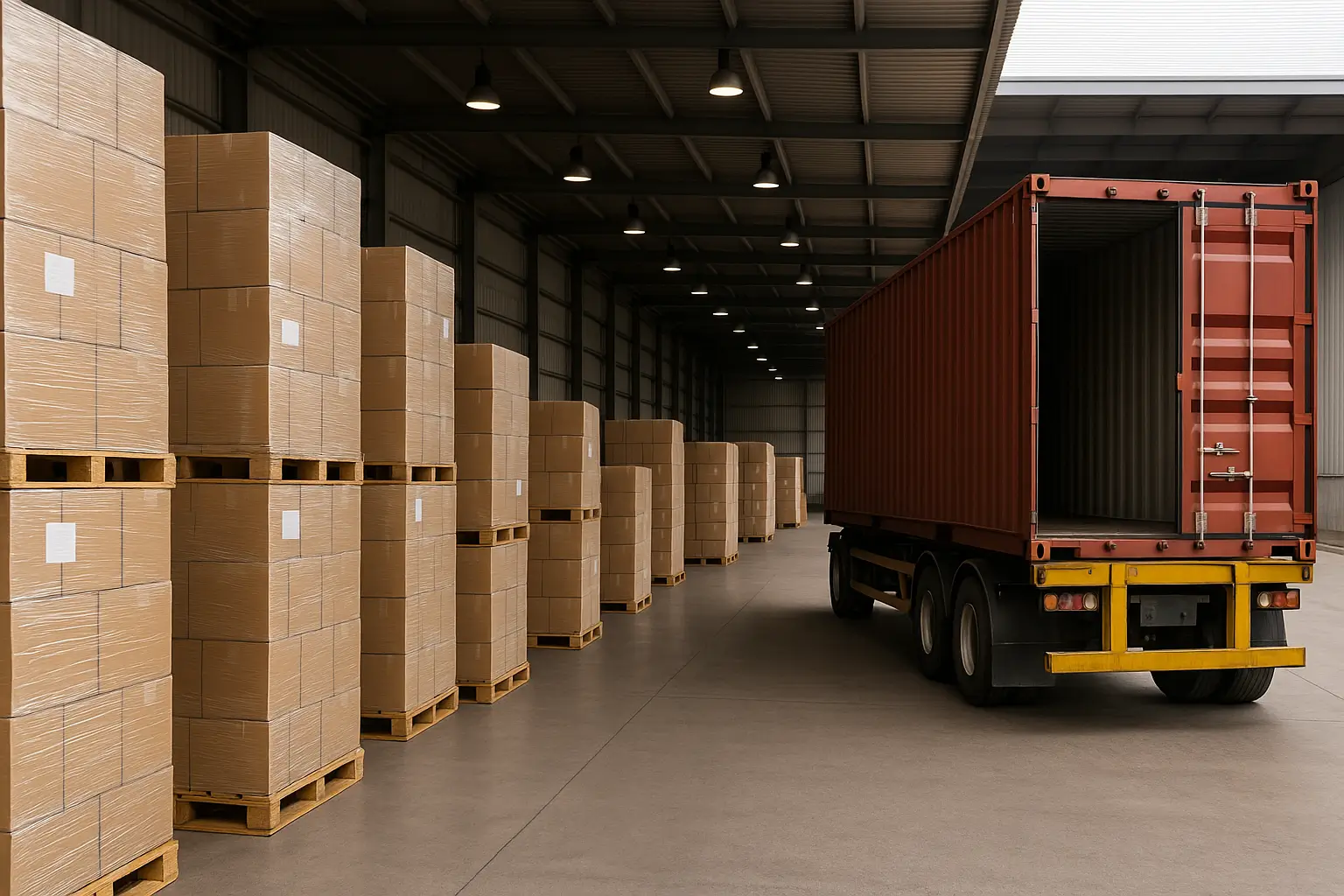The article gives a good overview of how to drop off pallets at LTL freight terminals. This enhancement adds new insights, tech advances, and industry best practices. It creates a stronger resource for shippers using LTL services.
Understanding Modern LTL Freight Operations and Technologies
LTL shipping has changed a lot. Now, digital systems and better operational models play a big role. Today’s LTL carriers use a smart hub-and-spoke system. This setup helps them route smaller shipments through key consolidation points efficiently. When your freight enters the network, it often passes through many terminals. Then, it finally reaches its destination. Knowing this model helps shippers get their freight ready for the many times it will be handled.
The Digital Transformation of LTL Shipping
The LTL industry has changed a lot recently. Carriers are using new technologies to boost efficiency.
- Electronic Bill of Lading (eBOL): The industry is quickly shifting to digital documents. The Digital LTL Council has set a new standard for Electronic Bills of Lading. This digital method cuts down on processing errors. It also boosts visibility and makes billing more efficient. By October 2022, the industry pushed for this standard to be widely adopted. Member companies promised to implement it by July 2023.
- Electronic Proof of Delivery (ePOD): LTL operations now use e-systems to confirm deliveries. These systems use digital signatures, QR codes, photos, digital fingerprints, and barcodes. They give real-time delivery status updates and remove the problems of paper systems.
- Transportation Management Systems (TMS) are specialized software. They help improve LTL operations. They consolidate orders, find backhauls, and automate route planning for several stops. These systems improve visibility for shipments. They also automate manual tasks, such as tendering and managing documents.
Advanced Freight Preparation Techniques
Professional Packaging and Palletization Methods
For better freight integrity during transit, try these advanced palletization techniques:
Strategic Pallet Selection and Building
When choosing pallets, think about their weight capacity. Also, check if they work well with automated handling equipment in the LTL network. Different pallet types—wooden, plastic, or metal—have different benefits. Your choice depends on your freight needs and destination requirements.
For optimal pallet building:
- Distribute weight to maintain a center of gravity in the middle of the pallet
- Maintain a height-to-base ratio to avoid tipping. Aim for a ratio of no more than 1.5:1.
- Use column stacking rather than interlocking when possible for maximum compression strength
Modern Packaging Materials and Methods
The packaging industry continues to evolve with more effective and sustainable options:
- Stretch Wrapping Technology: Today’s stretch wrap machines use smart automation. They place and apply stretch film accurately on pallet loads. These systems use smart film tension control. It adjusts tension during wrapping. This helps keep everything secure without causing damage.
- Dunnage Bags: These air cushions stop packages from moving in trucks or containers. Dunnage bags are made from high-quality materials like polypropylene raffia. They have several safety layers. During loading, these bags are inserted and inflated. This helps fill empty spaces between packages.
- Eco-Friendly Packaging Solutions: The logistics industry is moving to greener packaging. This includes recycled paper, bioplastics, and biodegradable foam. These sustainable solutions lower environmental impact and attract eco-friendly consumers.
Temperature-Controlled Shipping Solutions
Specialized insulated pallet shippers keep temperature-sensitive freight controlled for over 48 hours. These solutions use lightweight insulated panels. They keep refrigerated or frozen temps during cold-chain shipping. This means you don’t need costly refrigerated transport vehicles.
LTL Freight Classification and Pricing Essentials
Understanding NMFC Codes and Freight Classes
The National Motor Freight Classification (NMFC) system sorts freight using four main factors:
- Density
- Handling needs
- Stowability
- Value
The National Motor Freight Traffic Association made this system. It gives specific codes to various types of freight.
The NMFC system categorizes freight into 18 classes, numbered from 50 to 500:
- Lower numbers (50-85): Dense, durable items requiring minimal handling
- Mid-range numbers (85-175): Moderately dense items with standard handling requirements
- Higher numbers (175-500): Lightweight, fragile items requiring special handling
Knowing how to classify your freight is key. It affects shipping costs and which carrier you choose. Incorrect classification can result in reclassification charges, delivery delays, or even denied pickup.
LTL Pricing Factors and Optimization Strategies
Several factors influence LTL pricing beyond just weight and distance:
- Freight density and classification
- Origin and destination locations
- Special services required (liftgate, inside delivery, etc.)
- Accessorial charges for additional handling
- Carrier-specific discounts and pricing agreements
To optimize LTL shipping costs:
- Be flexible with shipping timelines to avoid expedited fees
- Consolidate smaller shipments when possible to minimize handling charges
- Ensure accurate dimensions and weight information to prevent reclassification fees
- Look at regional carriers for short distances. They usually provide faster transit times, often with next-day service and fewer handling points.
Enhanced Documentation Strategies
Implementing Electronic Bill of Lading (eBOL)
The traditional paper-based BOL process creates numerous inefficiencies. When a driver arrives for pickup, the shipper gives them a paper BOL. This BOL has a tracking number (PRO) written on it by hand. The document goes to the terminal. There, carrier staff manually enter shipment details. This process can cause errors. As a result, you may face shipment delays, invoice issues, and billing corrections.
Implementing eBOL provides significant advantages:
- Elimination of manual data processing and reduced exceptions
- Electronic data flow between shippers, 3PLs, and carriers
- Near-instantaneous PRO number assignment
- Enhanced shipment visibility and tracking
- Improved dock efficiency and billing accuracy
Digitizing the BOL process helps shippers reduce classification and invoice problems. This leads to a better customer experience and more dependable operations.
Electronic Proof of Delivery Systems
Modern ePOD systems provide several benefits over traditional paper-based proof of delivery methods:
- Real-time status updates on deliveries
- Digital signature capture
- Photographic evidence of delivery condition
- QR code scanning for package verification
- Elimination of paper handling and storage requirements
- Improved customer communication through automated notifications
Implementing an ePOD system helps businesses transition to paperless operations, reduce manual errors, eliminate information delays, and improve overall delivery accountability.
Specialized Shipping Considerations
Hazardous Materials and Chemical Shipping
When shipping chemicals or hazardous materials with LTL carriers, remember these safety tips:
- Regulatory Compliance: Choose carriers that understand the federal, FMCSA regulations
- Quality Control Processes: Ensure the carrier can quickly check chemicals in and out. This includes proper labeling, placarding, documentation, and checking container integrity.
- Train carrier staff, like drivers and dock workers, to get the right certifications. This is important for handling combustibles, contaminants, and toxic substances.
- Comingling Considerations: LTL shipments share space with other freight. So, carriers must manage how conflicting materials are transported together according to cargo securement requirements.
RTI Tracking and Management
Returnable Transport Items (RTIs) like pallets, totes, and roll cages are important assets. However, they often go missing in the supply chain. Tracking solutions such as RFID, BLE, and UWB help businesses keep an eye on their supply chain assets.
These systems find each asset and track where it goes. This helps stop loss and makes use better. Annual shrinkage rates usually range from 3-9%. By using RTI tracking, businesses can cut replacement costs. This can greatly boost profitability.
Advanced Best Practices for LTL Terminal Operations
Optimizing Transit Speed and Carrier Selection
Strategic carrier selection can significantly impact transit times and service quality:
- National carriers usually transport goods over distances of 800 to 1,200 miles. This process usually takes about 3 to 5 days. In contrast, regional carriers often offer next-day service. They have fewer handling points, which lowers claims and speeds up delivery.
- Intermodal Options: Use rail transport for some LTL shipments, especially over long distances. Intermodal solutions usually relate to truckload shipping. However, they can also save costs and help the environment for certain LTL freight.
Terminal Technology Advancements
Modern LTL terminals are implementing advanced technologies to improve efficiency:
- Automated Sortation Systems: These systems use conveyor belts and scanners to sort packages. They direct items to the right outbound trailers with little help from people.
- Dimensioning Systems: Automated freight dimensioning systems measure freight size and weight accurately. This helps with proper classification and makes trailer loading more efficient.
- Cross-Docking Technology: Advanced cross-docking speeds up operations. It speeds up storage time. It quickly moves freight from inbound to outbound vehicles with automated systems.
Cargo Insurance and Claims Management
Understanding LTL Carrier Liability vs. Supplemental Coverage
LTL carriers usually include basic liability coverage in their freight rates. This coverage has many limits. It restricts cargo types, reasons for loss, and reimbursement amounts. Supplemental cargo insurance offers more comprehensive protection:
- LTL Carrier Liability Coverage: This basic protection comes with standard rates. However, it has some important limits.
- Supplemental Cargo Insurance offers more coverage that you can customize. It’s especially useful for high-value shipments.
The recommended approach is to cover both the cargo value plus the freight cost. For example, if your cargo value is $1,000 and shipping costs $300, consider coverage for $1,300 total.
Filing LTL Freight Claims
When dealing with freight damage:
- Claims must be filed within 9 months of the delivery date
- Carriers have 30 days to acknowledge the claim and 120 days from acknowledgment to come to terms
- Concealed damage or shortage claims require notification within 5 business days of delivery
- Freight charges must be paid in full for claims to be processed
- Damaged freight must be kept for inspection until the claim is resolved
Knowing about freight claims, such as damage, loss, and shortage, helps you solve them well.
Looking Ahead: The Future of LTL Shipping
The LTL industry continues to evolve with several key trends shaping its future:
- Enhancing Digitization: eBOL, ePOD, and similar digital tools simplify operations. They also boost data accuracy.
- Sustainable Practices: There is a growing focus on eco-friendly packaging. Companies are also reducing carbon footprints by using optimized routes and alternative fuels.
- Automation: Greater implementation of automated handling systems, dimensioning technologies, and potentially autonomous vehicles requiring specialized Commercial Driver’s License training.
- Better Visibility: Advanced tracking systems give real-time updates and predict possible delays.
- Artificial Intelligence: AI applications for optimal routing, pricing, and predictive maintenance of equipment.
Useful Table Summarizing
| Step | Description | Key Details |
|---|---|---|
| Prepare Your Freight | Properly package, palletize, and label your shipment to ensure safety and compliance. | Use shrink wrap, secure freight, add labels on all sides, ensure pallet condition. |
| Gather Documentation | Complete and print the Bill of Lading (BOL), labels, and any required authorizations. | Include shipper/consignee info, PRO number, and special instructions if needed. |
| Contact the Terminal | Call ahead to confirm hours, available equipment (like dock ramps), and freight readiness. | Verify pickup hours, confirm freight is ready, ask about dock ramp availability. |
| Arrive at the Terminal | Check in with ID and BOL, and confirm your shipment is ready for pickup. | Present ID, PRO number, and documentation; confirm freight is prepared. |
| Loading Your Pallet | Terminal staff may load your pallet onto your vehicle using a forklift. | Confirm if they will load or if you need to break down freight; tip forklift operators if appropriate. |
| Final Inspection & Sign-off | Inspect freight for damage before signing the BOL, and receive a receipt. | Check for damages, ensure all labels are visible, and keep copies of documents. |
| Departure | Transport your pallet from the terminal to its destination. | Ensure your vehicle is suitable for the freight weight and dimensions. |



Leave a Reply